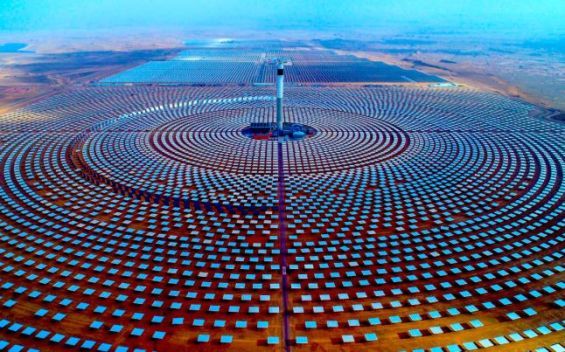A new study by researchers from Oxford’s Department of Engineering Science suggest that a rapid growth of Renewable Energy (RN) development in Morocco could lead to a «resource curse» if not carefully managed.
Published in March on Science Direct under the title «Renewable Energy in Morocco: A Resource Curse Risk Assessment», the study shows Morocco may be susceptible to the same pitfalls experienced by resource-rich countries like Nigeria and Angola, where abundant oil has retarded economic growth and promoted corruption.
«Transitioning to RE is seen as a way to reduce existing resource curse symptoms in countries that are already large oil and gas producers», the study indicates. However, «it could engender its own resource curse risk in RE-dominant countries», it warned.
«The risk of a RE-based resource curse is particularly high in low- and middle-income countries», the study emphasized. «RE resources such as solar energy tend to be more abundant in LMICs, creating significant opportunity to develop RE for export in the now-commonplace regional electricity trade», it explained.
Resource curse symptoms
Transnational renewable energy trade can create economic development; for example, renewable energy created an estimated 28,000 jobs in North Africa in 2019. However, this opportunity is also accompanied by risks, which are exacerbated by the tendency of LMICs to create weak institutions that can cause or exacerbate the resource curse, researchers warned.
«Morocco is also susceptible to many resource curse symptoms. For instance, to construct RE infrastructure, Morocco may take loans from international organizations like the Arab Fund for Economic and Social Development and the European Investment Bank, as it has done previously, risking economic dependence».
The study further highlights Morocco's current dependence on foreign technology and expertise for solar panels, wind turbines, and even installation and maintenance. This is evident in the use of a UAE company for maintaining the Noor 1 CSP plant and Spanish companies for project engineering.
While land availability is not a major constraint, the study warns that RE development could exacerbate water scarcity, a long-standing challenge in Morocco. Renewable energy projects require significant water for cooling, potentially creating tensions with the agricultural sector, which employs a third of Morocco's workforce and is crucial for food security and exports.
The establishment of RE infrastructure in the Sahara region could also lead to political and legal conflicts similar to those surrounding the exploitation of fish or phosphate resources.
Additionally, transmission lines and renewable energy farms can damage local flora, fauna, and landscapes, potentially harming other industries like ecotourism and agriculture.
The study also raises concerns about neglecting investments in social programs if RE revenues are concentrated in the hands of a few. Land conversion for RE projects could become more profitable than agriculture, reducing food productivity and security. The study terms this a potential «brain drain» as talent is diverted from other sectors to RE.
Other potential issues include job market domination by foreign workers, income inequality, and unfair land agreements with rural communities. The study warns that unchecked RE export could lead to trade imbalances, currency appreciation, and reduced economic diversification.
Additionally, high RE revenue could decrease government accountability and encourage corruption.
To avoid these pitfalls, the authors urge Morocco to carefully negotiate co-funding agreements to safeguard long-term growth and political autonomy, develop domestic innovation capabilities for RE and strengthen environmental impact assessments for RE projects.





 chargement...
chargement...













